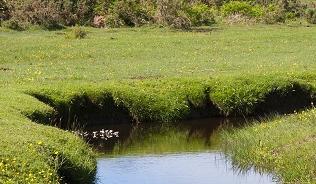On 24th September 2024 DAERA (Department of Agriculture, Environmental, and Rural Affairs) published its first Environmental Improvement Plan (EIP), as a requirement under the Environment Act 2021. This was following a 14-month delay, as the plan was due to be published on 25th July 2023.
Context
Many experts consider environmental governance in Northern Ireland (NI) to have historically been weaker than the rest of the UK. With NI’s main environmental concerns being biodiversity loss, pollution, and climate change, this needs to change moving forwards. There is a particular need for effective governance to fulfil the requirements of the UK-EU Trade Cooperation Agreement, as well as to meet domestic and international obligations.
The EIP is intended to be NI’s collective response to global challenges including biodiversity loss, greenhouse gas emissions, water, air, and soil quality, and developing a circular economy and waste management. It includes statutory and non-statutory changes. The plan will impact all NI citizens, businesses, and city, borough, and district councils.
The plan goes through NI’s historic responses to climate change initiatives and international policy. This includes the Biodiversity Strategy 2015-2020, the Peatland Strategy, and the Natural Recovery Strategy 2032.
It also sets out Six Strategic Environmental Outcomes (SEOs), discusses the status of each topic, and outlines the plan’s intended actions, targets and future visions and outcomes. These outcomes include a range of goals and targets. The SEOs are:
- Excellent air, water, and land quality
- A healthy and accessible environment and landscapes everyone can connect with and enjoy
- Thriving, resilient and connected nature and wildlife
- Sustainable production and consumption on land and at sea
- Zero waste and a highly developed circular economy, and
- Net zero greenhouse gas emissions and improved climate resilience and adaptability.
The SEOs show a series of laws, strategies, plans, and metrics to help implement the goals and targets set out by certain deadlines.
Laws
- March 2027: Complete a landscape policy/legislation review
- 2028: Development of revised/new fit-for-purpose outdoor recreation legislation
- November 2025: Review and report on the UK Joint Fisheries Statement and Fisheries Management Plans in accordance with the relevant provisions of the Fisheries Act 2020
- December 2024: Legislate for beverage containers and bottles to have lids and caps that will remain attached to reduce commonly littered bottle caps
- December 2024: Make new legislation to ensure greenhouse gas emissions reduction targets for the years 2030 and 2040 are in line with the Climate Change Act’s net zero by 2050 target
Strategies
- March 2024: Commission a Strategic Environmental Assessment of the next Nutrients Action Programme. Launch public consultation on SEA Environmental Report by December 2024
- December 2024: Publish the NI Peatland Strategy to set out the long-term vision for peatland protection, restoration & maintenance to 2040, which will assist in mitigating against climate change
- December 2024: Consult on the new Waste Management Strategy to gather views on the future of waste management in NI
- March 2025: Develop an Ammonia Strategy to deliver reductions in ammonia emissions from agriculture
- March 2027: Subject to policy/legislation review, publish a Landscape Strategy
- 2027: Publish Northern Ireland’s first Litter Strategy
- By 2030: Develop a Northern Ireland Marine Strategy to achieve Good Environmental Status in local seas, aligning with the UK Marine Strategy and regional approaches
- Dates to be confirmed:
- Secure Executive approval to launch a consultation on the Clean Air Strategy
- Publish an Outdoor Recreation Strategy, which will feed into the 2028 Outdoor Recreation Legislation
- Develop and implement a Culture, Arts and Heritage Strategy which embeds environmental outcomes
- Contribute to the development of the UK Chemical Strategy to ensure it takes account of NI’s unique position in relation to chemical legislation included in Annex II of the Windsor Framework
- The Draft Circular Economy strategy also outlines 12 proposals for change which will create more sustainable production and consumption patterns in NI
Plans
- 2024: Publish final River Basin Management Plans setting out actions to achieve Good Status in our water bodies and have the Programme of Measures in place by 2027
- 2024: Develop and put into operation a Nature Recovery Plan 2032 to support nature recovery and climate resilience
- By 2025: introduce Phosphorus and Nitrogen Balance targets for the NI agricultural sector, with a phased reduction to 2033 targets
- Dates to be confirmed:
- Implement the Education for Sustainability Strategy and Action Plan
- Implementation of Greenways, Bicycle Plans and Development of Transport Plans to promote health and wellbeing, better cities and towns and sustainable transport
- Update condition surveys and ensure appropriate actions are planned as a result
Metrics
- 2025: 50% of schools will have an Eco-Schools Green Flag
- From 2025: at least 80% of full net costs of packaging contributed by producers
- By 2027: 100% of waterbodies at Good Ecological Status (surface water) & Good Chemical Status (groundwater)
- By 2030: Maintain at least Sufficient status for all Bathing Waters, with 70% achieving Good or Excellent status throughout the bathing season
- 2030: At least 30% of land and freshwater protected, connected and managed for nature
- 2030: Increase NI woodland cover to at least 9% (124,000 hectares)
- 2030: 30% of seas protected, ensuring an ecologically coherent and well managed MPA network
- 2031: Increase overall recycling of packaging to 76%
- 2035: Achieve 65% of municipal waste recycled by 2035, with interim targets of 55% by 2025 and 60% by 2030 to protect the environment
- 2050: NI will have reduced its annual material footprint to 8 tonnes per person
The EIP also outlines a series of visions and outcomes for each of the SEOs that will contribute to their achievement, including fewer pollutants, high water environment standards, sustainable nutrient management, societal behavioural shifts, reconnection with nature, healthy marine environment, well-educated future generations, a circular economy, reduction of GHG emissions, and a resilient energy system. It also shows how the six strategic outcomes are all linked to each other in one form or another, as well as the United Nations’ 17 Sustainable Development Goals.
Other considerations
To achieve the SEO on 'thriving, resilient and connected nature and wildlife', there is an intended action to review natural capital assessments to understand needs and inform a Natural Capital Framework in Northern Ireland. There is also a target by 2027 to enhance NI’s natural capital reporting, data and habitat mapping systems to make natural capital and ecosystem datasets more readily available and integrate them into natural capital accounting and reporting systems (natural capital and ecosystems assessment platform).
Overall, the Environmental Improvement Plan for Northern Ireland has been welcomed as a crucial roadmap for Northern Ireland as it faces environmental crises, providing coherent and effective measures to improve the quality of the environment.
The publication of the EIP will support growth and climate change as part of the curriculum, as well as funding for the improvement of air quality, regeneration, blue economy, and nature positive initiatives. It will also create demand for skilled environmental scientists in waste management, biodiversity recovery, soil nutrient monitoring, marine environment protection, and water and air pollution monitoring and solutions. Ultimately, the EIP supports the delivery of the Environment Act 2021 in Northern Ireland as a statutory obligation and will enhance the Office for Environmental Protection’s oversight authority in Northern Ireland.
Bibliography
- Environmental Improvement Plan for Northern Ireland | DAERA
- Commitment to publish Northern Ireland’s EIP, but no mention of an Environmental Watchdog | CIEEM
- Northern Ireland's first environment plan approved by executive | BBC News
- Northern Ireland’s new Environmental Improvement Plan: Everything you need to know | ENDS Report
- DAERA Minister welcomes approval of Northern Ireland's Environmental Improvement Plan | Water Magazine
- The Office for Environmental Protection Investigates the Department for Agriculture, Environment and Rural Affairs Over Failure to Publish Environmental Improvement Plan | Office for Environmental Protection
- Pioneering environmental strategy published by Stormont | The Planner
- Office for Environmental Protection welcomes Northern Ireland’s first Environmental Improvement Plan being published | Office for Environmental Protection
- Department of Agriculture, Environment and Rural Affairs - Approval and Publication of the Environmental Improvement Plan | NI Assembly
- THE 17 GOALS | Sustainable Development | United Nations
- NI nature facing unsustainable pressure, says watchdog | BBC News
- Environmental Plans, Principles and Governance for Northern Ireland.pdf | Ulster Wildlife





